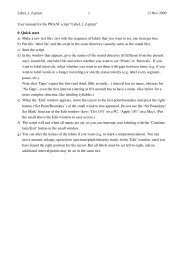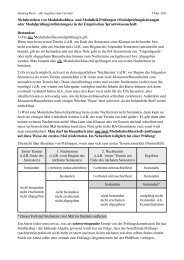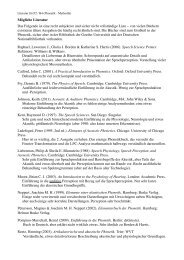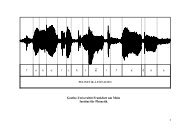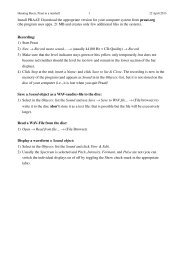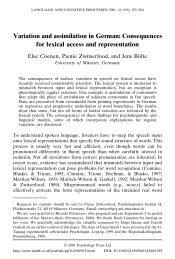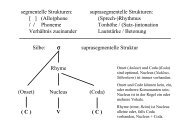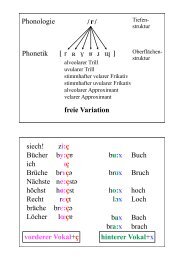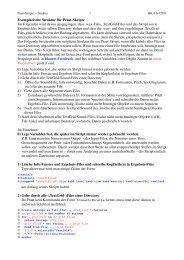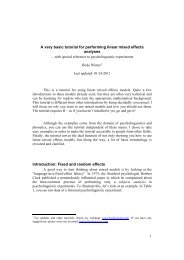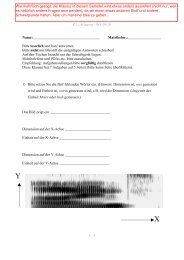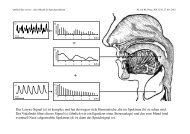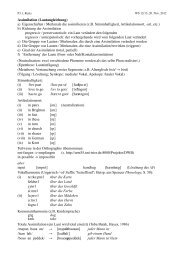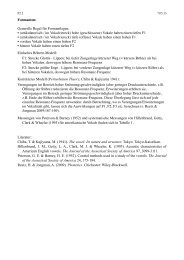Language and Cognitive Processes - Institut für Phonetik
Language and Cognitive Processes - Institut für Phonetik
Language and Cognitive Processes - Institut für Phonetik
Create successful ePaper yourself
Turn your PDF publications into a flip-book with our unique Google optimized e-Paper software.
Downloaded By: [Universitaetsbibliothek] At: 15:27 19 June 2007<br />
PHONOLOGICAL PRIMING 381<br />
question was examined using the phonological priming paradigm with<br />
bisyllabic words. We found that partial priming (i.e., when the prime is the<br />
rst or the second syllable of the target) facilitates target processing when<br />
the prime/target pairs are presented in the auditory modality (Experiment<br />
1a <strong>and</strong> 1b). On the basis of the results of Experiments 2 <strong>and</strong> 3, we<br />
suggested that nal overlap facilitation was prelexical, whereas initial<br />
overlap facilitation reected the activation of c<strong>and</strong>idates at a lexical level<br />
of processing.<br />
Interpretation of the partial priming results<br />
In the interpretation of the results, we have made a distinction between the<br />
effects observed in the nal <strong>and</strong> beginning overlap conditions. For partial<br />
priming, we found a nal-overlap facilitation effect for word <strong>and</strong><br />
pseudoword primes in the auditory-auditory modality. The nal-overlap<br />
facilitation disappeared when primes <strong>and</strong> targets were presented in two<br />
different modalities. Taken together, the results suggest that the nal<br />
overlap facilitation effect is prelexical. By prelexical, we mean that the<br />
processing of the prime does not involve the activation of the lexical<br />
representation of the target. The facilitation effect does not arise from the<br />
preactivation of the representation of the target but from the preactivation<br />
of the sublexical units (e.g., phonemes) shared by the prime <strong>and</strong> the target.<br />
If the sublexical units preactivated during the processing of the prime are<br />
not reheard, as it is the case in the crossmodal condition, the nal overlap<br />
facilitation is not observed.<br />
In the initial-overlap partial priming condition (e.g., ver-VERTIGE), we<br />
also found facilitation but we suggest that the processing underlying the<br />
beginning overlap facilitation effect is different from that at the basis of the<br />
nal facilitation effect. We found this effect with both word <strong>and</strong><br />
pseudoword primes in the auditory-auditory modality condition. Moreover<br />
the effect remained when tested in the crossmodal condition. For that<br />
reason, we suggest that the beginning overlap facilitation effect occurs at<br />
the lexical level. By lexical, we mean that the processing of the prime<br />
induces the activation of the lexical representation of the target. The<br />
facilitation effect results from the fact that the lexical representation of the<br />
target (e.g., VERTIGE) has been preactivated during the processing of the<br />
prime (e.g., ver) <strong>and</strong> has not been deactivated at the time of target<br />
presentation. This is not the case in the control (unrelated) condition in<br />
which the lexical representation of the target has not been preactivated at<br />
all. The facilitation effect is based on the fact that the representation of the<br />
target remains activated after the end of prime presentation. This implies<br />
that the system does not take the silence occurring at the end of the prime<br />
(ISI) as mismatching information regarding the form representation of the



